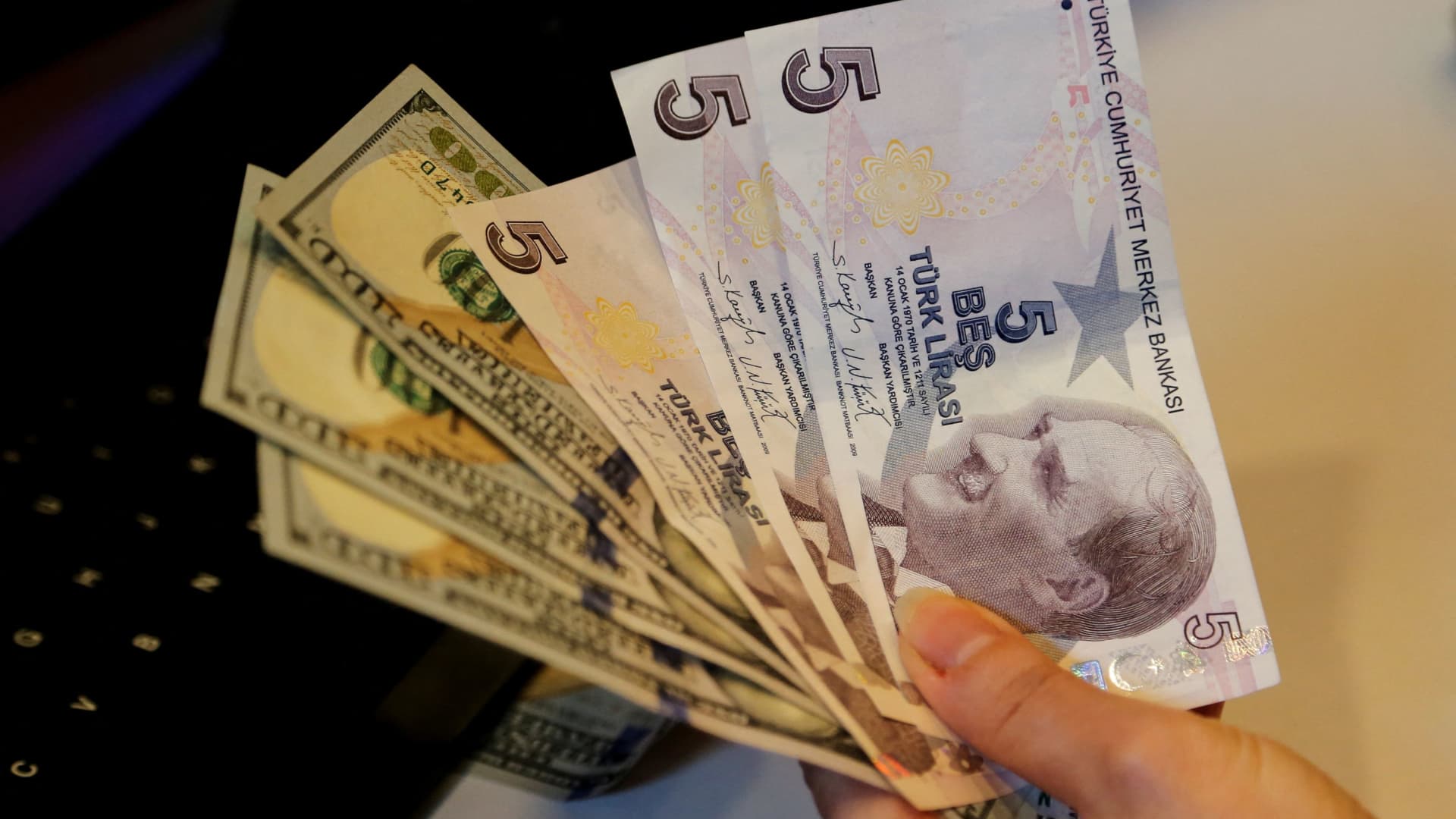A money changer holds Turkish lira and U.S. dollar banknotes at a currency exchange office in Ankara, Turkey December 16, 2021.
Cagla Gurdogan | Reuters
Turkey’s annual inflation rose to 68.5% for the month of March, an increase on February’s 67.1% inflation read, according to the Turkish Statistical Institute’s report released Wednesday.
The monthly rise in consumer prices came out at 3.16%, led by education, communication, and hotels, restaurants and cafes, which saw month-on-month rises of 13%, 5.6%, and 3.9%, respectively.
On an annual basis, education again saw the highest cost inflation at 104% year-on-year, followed by hotels, restaurants and cafes at 95% and health at 80%.
Turkey has launched a concerted effort to tackle soaring inflation with interest rate hikes, most recently raising the country’s key rate from 45% to 50% in late March.
Much of the inflation in recent months stems from a significant increase to the minimum wage that Turkey’s government mandated for 2024. The minimum wage for the year rose to 17,002 Turkish lira (around $530) per month in January, a 100% hike from the same period a year prior.
Economists expect further rate hikes from the central bank will be necessary.
While the March inflation count represents “the smallest monthly increase in three months and suggests that the impact of the large minimum wage hike in January may now have largely passed, it is still far from consistent with the single-digit inflation that policymakers are trying to achieve,” Nicholas Farr, an Emerging Europe economist at London-based Capital Economics, wrote in an analyst note Wednesday.
“The latest inflation figures do little to change our view that further monetary tightening lies in store and that a more concerted effort to tighten fiscal policy will be needed too,” he said.
Turkey’s central bank implemented eight consecutive interest rate hikes from June 2023 to January 2024, totaling a cumulative 3,650 basis points. It paused in February, suggesting the tightening cycle was over, before raising rates again in March, citing “deterioration in the inflation outlook” and saying that “tight monetary stance will be maintained until a significant and sustained decline in the underlying trend of monthly inflation is observed.”
Supporters of Istanbul Mayor Ekrem Imamoglu, mayoral candidate of the main opposition Republican People’s Party (CHP), celebrate following the early results in front of the Istanbul Metropolitan Municipality (IBB) in Istanbul, Turkey March 31, 2024.
Umit Bektas | Reuters
Analysts note that with Turkey’s local elections, which took place on March 31, out of the way, pushing ahead with tighter monetary policy will likely be easier. The vote for municipal leaders across the country, which took place on Sunday, saw Turkey’s opposition party deal a historic blow to Turkish President Recep Tayyip Erdogan’s ruling AK Party, winning the country’s five largest cities and several rural areas as well.
Economic pain and steep living cost increases for ordinary Turks over the last several years played a major role in the results, political observers said.
Exercising tight control over the central bank, Erdogan for the last few years refused to raise rates, calling them “the mother of all evil” and insisting, against economic orthodoxy, that lowering rates was the way to cool inflation. This was despite declining foreign currency reserves and a rapidly weakening Turkish lira, which has lost some 82% of its value against the dollar in the last five years.
Only after appointing a new finance and central bank team in May of 2023 did the central bank stage a turnaround in policy, suggesting greater independence at the bank from the executive branch of Turkey’s government. But the political loss for Erdogan’s party in the March local elections could make his future moves more unpredictable, some analysts say.
“The outcome of the vote fuels political uncertainty and raises doubts about whether President Recep Erdogan will stick to unpopular orthodox policies,” Bartosz Sawicki, a market analyst at fintech firm Conotoxia fintech, wrote in a note. But, he added: “With no elections until 2028, another overhaul leading to the return of extra-loose monetary policy seems unlikely.”





















Discussion about this post